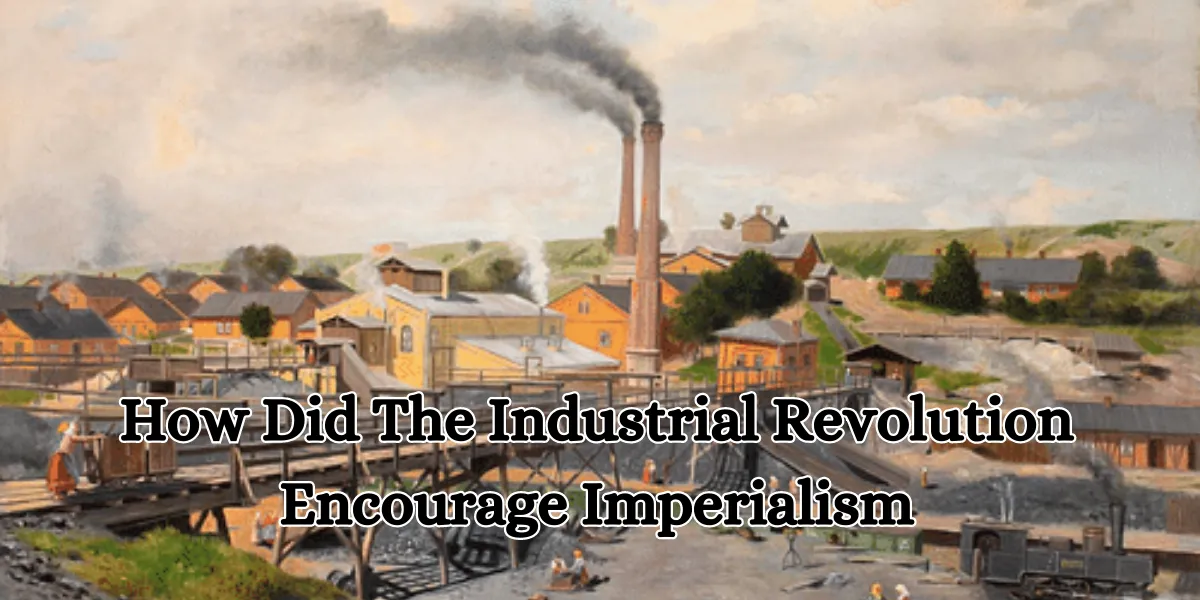The intertwining of the Industrial Revolution and the phenomenon of imperialism marks a pivotal juncture in world history. How Did The Industrial Revolution Encourage Imperialism. The rapid advancements in technology, coupled with economic shifts, reshaped the geopolitical landscape and facilitated the spread of imperialistic ambitions. This article delves into the intricate relationship between the Industrial Revolution and the encouragement of imperialism, highlighting the factors and mechanisms that led to this convergence.
Economic Impetus and Resource Extraction
Transformative Technological Innovations
The Industrial Revolution, which commenced in the late 18th century, bore witness to groundbreaking technological innovations. From mechanized textile production to steam-powered machinery, these advancements revolutionized productivity and transformed industries. This technological surge, often referred to as the First Industrial Revolution, necessitated an ample supply of raw materials and resources. European powers, driven by a quest for economic expansion, turned to imperialistic endeavors to secure access to resources such as cotton, rubber, and minerals.
Exploitative Colonial Enterprises
Imperial powers recognized the economic advantages of establishing colonies to extract and exploit resources. The British Empire, for instance, engaged in the cultivation of cash crops in India and Africa, channeling these resources back to the mother country for processing and trade. The establishment of resource extraction centers further solidified the connection between industrial growth and imperialism.
Market Expansion and Trading Networks
Manufacturing and Market Demand
The surge in manufacturing output during the Industrial Revolution led to an unprecedented increase in the production of goods. To ensure sustained economic growth, imperial powers sought new markets to absorb their surplus goods. Colonies served as captive markets, enabling the export of manufactured products while stimulating domestic economies. This symbiotic relationship bolstered imperial expansion as well as industrial growth.
Development of Global Trading Networks
The establishment of colonies not only facilitated the exploitation of resources but also contributed to the development of extensive global trading networks. Imperial powers invested in building infrastructure such as railways, ports, and telegraph lines, connecting distant regions and enabling efficient movement of goods. These networks, designed to serve imperial interests, inadvertently fostered interdependence among nations and regions.

Technological and Military Superiority
Military Dominance and Imperialistic Motives
The technological advancements of the Industrial Revolution also translated into military supremacy for imperial powers. Modern weaponry, mechanized transport, and communication systems provided a distinct advantage over less-developed societies. This military superiority, combined with imperialistic motivations, enabled European powers to exert control over vast territories and peoples.
Justification and Ideological Pretexts
Imperialism was often justified using ideological pretexts such as the “White Man’s Burden,” claiming that advanced societies had a moral duty to civilize and uplift less-developed regions. These justifications, although contentious, played a role in garnering domestic support for imperial endeavors. Technological prowess further bolstered the belief in European superiority, legitimizing expansionist policies.
Geopolitical Competition and Nationalism
Geopolitical Rivalries and Imperial Expansion
The Industrial Revolution intensified global competition among European powers. As nations vied for economic supremacy, the acquisition of colonies and strategic territories became emblematic of national prestige. The “Scramble for Africa” and similar episodes showcased the race to secure new territories, often driven by a desire to outdo rival nations.
Emergence of Nationalistic Sentiments
Industrialization nurtured nationalistic sentiments within European societies. The economic prosperity brought about by industrial growth fueled a sense of pride in one’s nation. This fervor, coupled with imperialistic successes, reinforced the belief in the superiority of the European way of life. Nationalism and imperialism became intertwined, further encouraging expansionist agendas.
A Complex Nexus
The Industrial Revolution’s impact on imperialism was a complex interplay of economic, technological, and ideological factors. The quest for resources, the need for new markets, technological advancements, and geopolitical rivalries converged to encourage imperialistic ambitions. While the Industrial Revolution marked a significant milestone in human progress, it also underscored the darker facets of expansionism and exploitation.
Abu Mansoor Plastic Factory:
Abu Mansoor Plastic Factory, a prominent industrial venture, plays a pivotal role in producing essential plastic products, contributing to regional economic growth and sustainability.
Emirates Industrial Gases:
Emirates Industrial Gases stands as a key player in providing vital gases to various industries, driving innovation and progress across sectors with its reliable and quality-driven services.


